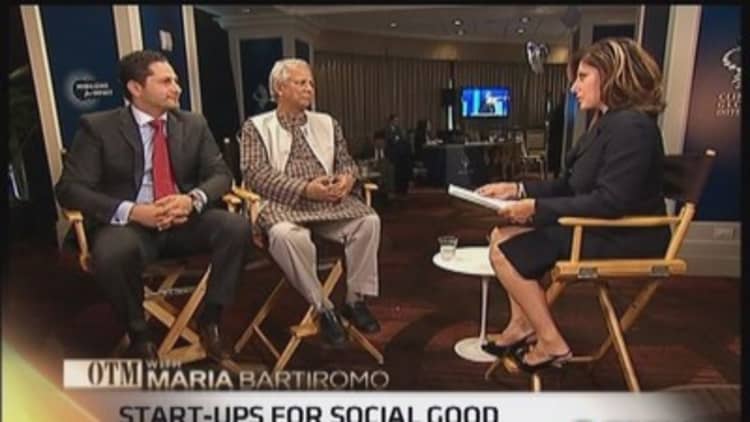Ending world hunger is a lofty goal with a United Nations' estimate of 870 million people being uncertain of their food supplies. One start-up is poised to tackle this challenge head-on after winning the 2013 Hult Prize and its $1 million capital investment. The game-changing idea? Bugs.
It's called Aspire.
"Aspire is about empowering people living in peri-urban slums to provide food security to people who live in [those] urban slums. We do so by providing them with insect farms, which are farming units that will allow them to farm insects," said CEO Mohammed Ashour, a McGill University MBA candidate.
Today, 2 billion people consume protein-rich insects, but only when they're in season. The company's business model is to harvest a variety of insects year-round through their network of rural and peri-urban farmers. It will then process the insects into foodproducts, like insect-fortified flour or lime cricket chips, and sell them to local distributors. This kind of innovation is what Hult Prize Founder and CEO Ahmad Ashkar hoped for when he first began challenging the world's brightest MBA students to address global issues through a social entrepreneurship competition.
(Read more: 11 entrepreneurs teaching the next generation)
"We need ideas. We need disruption. We need new social businesses. We're looking at the business-minded students to do that," said Ashkar, a former management consultant and Hult International Business School MBA graduate.

Ashkar initiated the idea while in business school after a chance meeting with Charles Kane, founder of the One Laptop Per Child organization and now a Hult Prize board member. He has since expanded it into a global competition with the support of the Hult International Business School and the Clinton Global Initiative. In the prize's four years, participation has grown to more than 11,000 students representing 350 universities worldwide.
"What we do is we host regional events [in] six cities: Boston, San Francisco, London, Dubai, Shanghai, and Sao Paolo, Brazil. And each one of those cities, we call to action university students who create the prototypes, who create the start-ups that then are pitched," Ashkar said. "And then we move them into an incubator. And from the incubator, right here to New York,"
Last week, the six winning regional teams pitched their ideas "American Idol"-style to a panel of judges at the Clinton Global Initiative's annual meeting in Manhattan. Notables from the banking and nonprofit worlds, including Standard Chartered Bank CEO Peter Sands and the United Nations Foundation President and CEO Kathy Calvin, questioned the students on their potential impact as well as their profitability.
(Read more: Clinton: Debt ceiling as strategy is 'disastrous')
"Charity money has only one life. It's a very good life, but only one life," fellow judge and 2006 Nobel Peace Prize winner Muhammad Yunus told the audience. "But if you transform it into social business money, then it becomes a life of eternity."
For the judges, McGill University's Aspire team emerged as the clear winner. "Our health problems come from the food, either through overeating or not eating the right way, not eating the right food," Yunus said. "So if you can find a good, healthy food, [and] this is a healthy food, … then it changes everybody, not only the food-short country, but even the food-surplus country."
U.N. World Food Program Executive Director Ertharin Cousin echoed his enthusiasm and asserted the world needs more Hult Prizes. "I was excited by what I saw … because these are young people who are attending some of the best business schools around the world. They have the opportunity to go work for the institutions where they could make a great deal of money, but they chose to use that brainpower, use these great educations to focus on how to make the world better," Cousin said.
Aspire, which includes McGill University students Shobhita Soor, Zev Thompson, Gabriel Mott, and Jesse Pearlstein, will launch next year in Mexico, where it's already secured a distributor. "We've recruited farmers in peri-urban areas. All we need from the money is really to finalize the prototyping of our insect farm so we can deliver them to our farmers and set up our hubs so we can begin operations immediately," Ashour said.
Aspire intends to feed 21 million people with its insect products over the next five years, themselves included. "I like the worms, the silk worms," said marketing chief Soor. "The chapulines, the grasshoppers," Ashour said. "If you tried them, you'll know exactly what I mean."
—By Marqui Mapp, CNBC.




